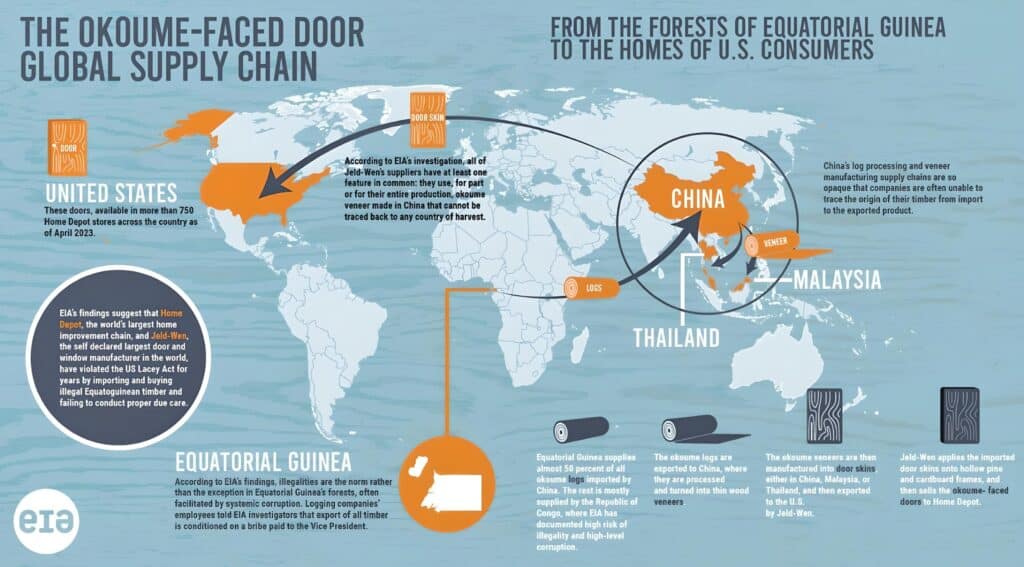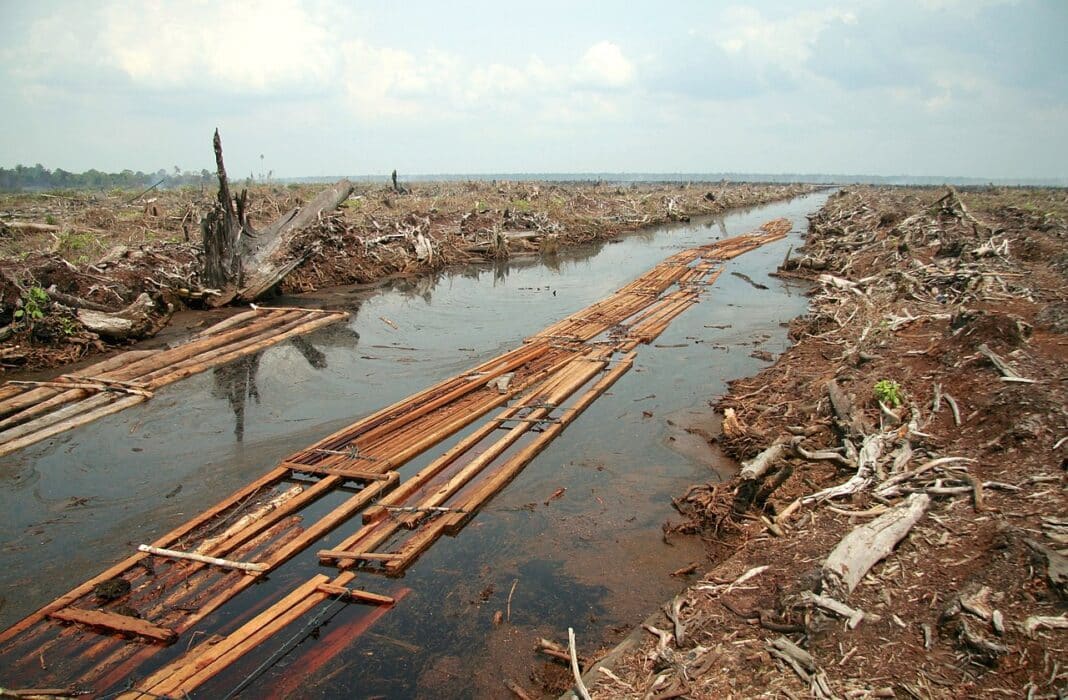A new report claims that up to 2% of the US economy is ‘dirty money’, leading Treasury Secretary Janet Yellen to describe the US as “the best place to hide and launder ill-gotten gains.”
It includes “timber trafficking”, with a UN Body claiming that “forest crime has all the hallmarks of organised and sophisticated crime” and is “fertile ground for corruption.”
According to INTERPOL, the economy connected to environmental crime is enormous, amounting to US $281 billion last year alone.
The illegal timber trade is worth billions, with High returns and low prosecution rates attracting organised crime.
“In the past year alone, 120 million tons of European timber had no official certificate of origin,” according to a new report by DW Europe.
Last week, Wood Central reported on “China’s Manufacturing Black Box”, which has seen the Chinese exploit its Belt and Road partnerships to export millions of manufactured timber products via ‘bad actors’ in the African Basin.
However, illegal forest activity is also rampant in Latin America – with proceeds from unlawful activities easily laundered through US companies and real estate.

Published by the FACT Coalition last month, “Dirty Money and the Destruction of the Amazon: Uncovering the US Role in Illicit Financial Flows from Environmental Crimes in Peru and Colombia“, analyses the links between financial secrecy and crimes in the Amazon.
The report highlights several case studies from Peru and Colombia demonstrating how illicit financial flows from environmental crimes wind up in the US.
“Environmental crimes have become a key source for money laundering operations of illicit networks and armed groups, which fuel corruption,” according to Ian Gary, the Executive Director of the FACT Coalition.
“With gaping holes in its anti-money laundering regulations, the US has become an attractive place for environmental criminals to launder illicit money,” he said.
In recent years, the UN Office on Drugs and Crime has noted “an alarming increase” in timber trafficking connected to drug trafficking and corruption.
“The illegal timber trade is a complex issue, often involving multiple actors in multiple countries,” the UN said.
“Illegal activities can occur at all stages in the timber supply chain and range in complexity from local illegal harvesting to international and highly organised criminal syndicates with established commercial supply chains.”
Because timber has complicated supply chains, especially wood-based cabinets, flooring, weather-resistant decks, and wooden furniture, consumers have difficulty tracing where wood comes from and whether it is legal.
“In many instances, these products are made of tropical wood that presents desirable colours, grains, and durability and are in the vast majority of cases sourced outside of the country,” according to a report by the Environmental Investigation Agency.

While ecolabels like PEFC and FSC help address concerns, ignorance around how the certification works can lead to false and fraudulent product claims.
“Amongst the myriad of issues with forest certification is that the supply chain, procurement professionals and ultimately the consumer do not know what to look for to verify that the product is certified,” a source connected to forest certification told the Wood Central publisher.
“The key is to look at the formal claim on the product itself and to check that the product information matches up with the FSC and PEFC databases for certified products,” they said before adding that “both databases effectively provide the ingredients for the products.”
“If you follow proper due diligence, both schemes effectively address the flood of trafficked timber entering global supply chains.”
Timber, like gold, also converges with other crimes like drug trafficking and corruption.
When cartels need to launder money through cattle ranching, for example, they often clear isolated parts of protected forests, with the timber becoming an added revenue stream.
Last year, Mongabay reported on Home Depot’s purchases of plywood sourced from mega-diverse forests like Ecuador’s Chocó, where illegal deforestation has long been a problem.
Earlier this year, it found that a member of Cambodia’s military was running illegal logging operations connected to wood furniture products in the US.
“That kind of crime is only possible because of the lawyers, accountants and trust and corporate service providers who work as intermediaries,” according to the Financial Action Task Force, an intergovernmental organisation monitoring the financial flows of criminal groups.
“Freight forwarders, insurers and customs brokers can also play a role”, it said, “because they all take advantage of huge gaps in US financial regulations.”
While the US has a robust anti-money laundering (AML) framework, critical gaps – like the prevalent use of anonymous entities and the failure to bring certain professional gatekeepers, such as lawyers and accountants, under AML rules – make the country susceptible to an influx of illicit financial flows from environmental crimes.
This is a problem, according to Susanne Breitkopf, Deputy Director of the Forest Campaign, who said the gaps are “a major obstacle to global efforts to combat the climate crisis.“
“It’s clear that nature crimes need to be a stronger part of the global policy conversations around climate change, national security, and domestic governance. As a premier supplier of financial secrecy, the US has a crucial role in denying a financial haven to criminals that would degrade the environment.”
The report offers several recommendations, including information sharing and capacity building in the Peruvian and Colombian Amazon.
“Civil society groups and government officials in Peru and Colombia have told us the US must collaborate to address financial secrecy, including the scourge of anonymous shell companies,” Mr Gary said.
“The US government must ensure that our financial system does not harbour illicit financial fuels fueling environmental degradation in the Amazon and beyond.”






